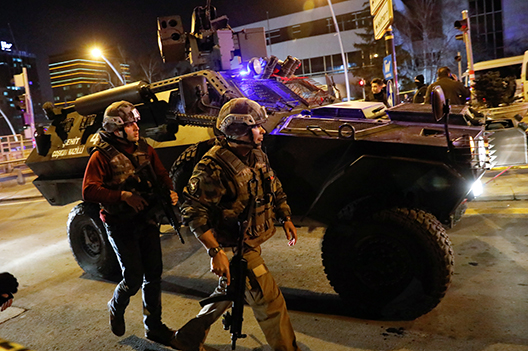 At an art exhibition opening on Monday evening, right across the street from the US embassy in Ankara, an assassin shot dead Russian ambassador to Turkey Andrey Karlov. The shooter, identified as 22-year-old Mevlüt Mert Altinas, was a Turkish policeman according to statements made by the mayor of Ankara.
At an art exhibition opening on Monday evening, right across the street from the US embassy in Ankara, an assassin shot dead Russian ambassador to Turkey Andrey Karlov. The shooter, identified as 22-year-old Mevlüt Mert Altinas, was a Turkish policeman according to statements made by the mayor of Ankara.
According to early reports, Altinas was not on duty on Monday night, but Rafik Hariri Center Senior Fellow Aaron Stein believes his police badge allowed him to get close enough to the ambassador to carry out the assassination. “Early reports say that the Russian ambassador does not travel with heavy security—it’s a point of pride for Russian diplomats,” Stein tells MENASource. “The pictures and the video of the attack show that he was able to get very close to him before firing the shots.”
As he shot Karlov, the gunman is reported to have yelled “Don’t forget Aleppo! Don’t forget Syria!” He also yelled, “Stand back! Stand back! Only death will take me out of here. Anyone who has a role in this oppression will die one by one.” According to AP, he was later killed by Turkish police.
What can we expect from the Russians in response to the assassination?
Aaron Stein: There have been some reports in Russian state agencies that this was a grave breakdown in Turkish security, and that’s obvious. A Turkish police officer recruited into the force, radicalizes, and carries out an assassination. That’s a big deal. But in terms of official reaction, I have not yet seen anything.
What is the potential fallout from the incident?
AS: Like so much in Russian-Turkish relations, it depends on what Russia decides to do. This is obviously embarrassing for Turkey. The police officer was, at some point, radicalized. Early reports say that he yelled a slogan associated with Jabhat al-Nusra or Jabhat Fath al-Sham. This claim turned out to be false. The nasheed is fairly common, so one cannot infer loyalty, other than the assassin was obviously committed to killing a representative of the country he blamed for the Aleppo tragedy.
Russia has a clear strategy inside of Syria, which is to present the international community, particularly the United States and the backers of the opposition, with a fait accompli: ‘You’re either with us and with the regime against a band of terrorists, or you’re on the side of the terrorists.’ And one thing that the Turkish agreement over Aleppo will do is, with the Russian and regime “victory” inside of Aleppo and the forced displacement of thousands of people, bring them one step closer to that goal. People from Aleppo moving into Idlib—a place where the backbone of the insurgency is Ahrar or Jabhat Fateh al-Sham or Nusra—creates an opportunity for Russia to really expand the scope of its bombing campaign. Speaking before any official Russian reaction to this, Russia has an incentive to obviously express anger, outrage, and sorrow, but nevertheless maintain the rapprochement it’s built with Turkey because it is to its benefit inside of Syria—in the short term at least.
MS: How has Turkey reacted to the assassination?
AS: The Turkish reaction domestically is already going to the theory that this man is an operative of the Fethullah Gulen movement. They’re pointing to where he went for tutoring sessions for a high school entrance exam as proof that he has Gulenist links. (Update: This claim has since turned out to be false.)They’re going to run with this no matter what, whether he was a Gulenist or not, and this will actually cause friction for US-Turkish relations. Turkey’s attempts to extradite Gulen from the US had faded a little into the background since the July 15 coup, but they will come back.
The Turks like to perpetuate the story that the Turkish pilot that shot down a Russian jet in November 2015 was not acting on orders from the air force, and therefore was not acting on orders from Erdogan. Instead, they say he was acting on orders from Pennsylvania, and so, therefore was under the control of Gulen. This contradicts entirely the official narrative put forward in the Turkish press after the shooting down; nevertheless, it’s something that has been latched on to. So immediately, within hours of the assassination, the narrative is that the assassin is not one of us, he’s a Gulen member, and just like with the November shootdown of the Russian plane, this is a Gulenist plot to try and upset Turkish-Russian relations. This will cause problems for the Turkish-US relationship as well. It depends on how Russia reacts but the actual negative fallout could blow to Washington rather than to Moscow.
Image: Turkish police secure the area near an art gallery where the Russian Ambassador to Turkey Andrei Karlov was shot in Ankara, Turkey, December 19, 2016. REUTERS/Umit Bektas
